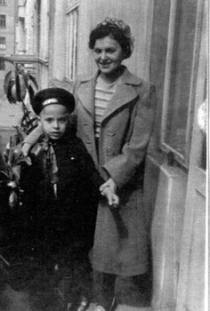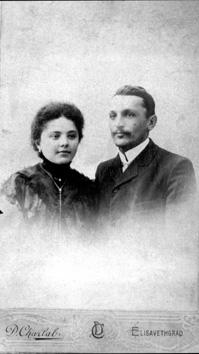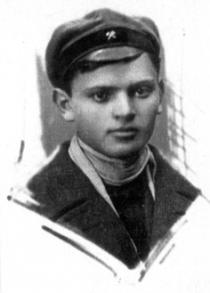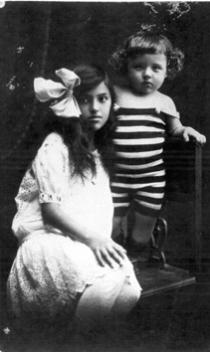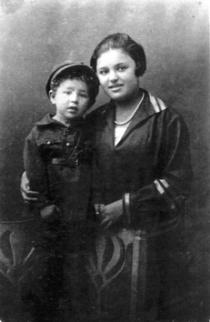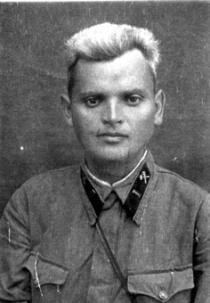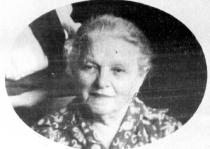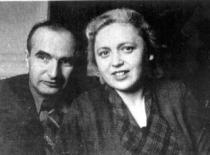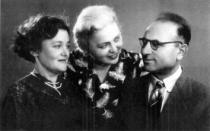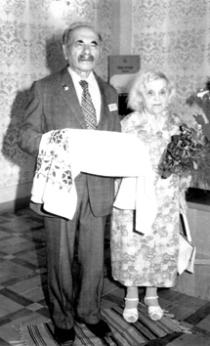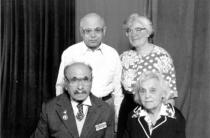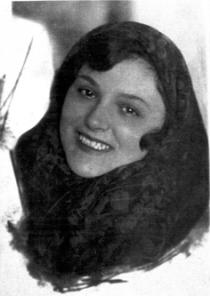
My family background
I was born in the village of Novo-Ukrainka, Elisavetgrad province in 1913. My father Mendel Mexin was born in 1874, in the town of Tsvetnoye, Cherkasy province. My mother’s name was Hana, nee Balahovskaya, she was born in Tsvetnoye in 1884.
My grandfather on my father’s side Yankel Mexin was born in 1848 in Cherkasy province. I don’t know whether he was also born in Tsvetnoye. My grandfather died before he reached forty years of age. Even my father didn’t remember him well. I don’t know were my grandmother Tumer (Tamara) Mexina was born either. She was born in 1850. I don’t know her nee name.
There were five children in the family. The oldest was Abram, born in 1870. The second son was Lev, born in 1872. Then in 1874 my father Mendel was born. The next were two daughters: Doba, born in 1875, and the younger Eva, born in 1878. There also was the youngest brother, but I don’t remember his name.
Their family was quite wealthy. My grandfather owned a small store. It was the store where they were selling both food and clothing. My grandfather often went on trips to purchase goods and during his absence my grandmother worked at the store. And during such periods they had a housemaid coming – a local Jewish girl. When my grandfather was back at home, my grandmother managed without a housemaid. They lived in a big wooden house, as my father recalled. One half of it was where they lived. There were 4 rooms: a bedroom and two children’s rooms for girls and boys. There was also a big dining room where the family got together in the evenings. My father didn’t remember the furnishing, but he remembered a huge cupboard with carving. Besides everything else my grandmother used to keep jars with jam and candy in this cupboard – that was probably why my father remembered it so well. In the 2nd half of the house there was the store. It was open from early morning till late at night. It often happened so that there was a late customer knocking at the door when the family was about to go to bed and my grandfather went to open the store to sell goods to a night visitor. We didn’t have a kitchen garden, but there was a big orchard behind the house and a flower garden in front of the house. It was the responsibility of my grandmother to look after them and she didn’t let her housemaid or her daughters to look after it.
Their family was religious and they celebrated Jewish traditions in the house. On Saturday parents went to the synagogue. Their sons also started going there when they grew older. All of the boys studied in the cheder. The girls got their education at home. They spoke Yiddish in the family, but the children knew Russian, too.
My grandmother used to wear a wig when she was young. I knew her when she was an old woman. She lived in our family for some time. At that time she used to wear a dark shawl on her head.
They strictly followed the kashruth in the family. My grandmother used to light candles for Sabbath. She made Saturday meals on Friday. They went to bed early when it was getting dark. My grandmother never turned on the light. In winter when they had to heat the house their Ukrainian neighbor came to make a fire and put some wood in the stove. The family celebrated all Jewish holidays. That’s all my father told me about it.
In 1887 my grandfather Yankel died. My grandmother was raising her children by herself. She didn’t get married again. Her older sons helped her with the store and the girls did the cooking and housework.
In 1892 my grandmother sold the house and the store. The family moved to Novo-Ukrainka, Elisavetgrad province (Kirovograd region at present). They bought a small house there and the sons were learning forestry from the local forester.
The oldest daughter Doba married a young Jewish doctor from Kharkov in 1898. I think his last name was Birman. Doba moved to Kharkov. Her husband was working at the hospital after graduating from the Medical department of Kharkov University. His parents also lived in Kharkov. Doba was a housewife. She didn’t have children. During the war Doba was in the evacuation in Ural. Her husband volunteered to go to the front, although he didn’t have to go considering his age. He went with the hospital train. He was shell-shocked during the war. In two years after the war he lost hearing. Besides, he was suffering from splitting headaches due to this shell shock. It might have been the reason of the stroke that he died from in 1950. Doba visited us several times. She died in Kharkov in 1956.
Eva met her future husband in Kharkov when she was visiting her sister. He was a friend of Doba’s husband, a young Jewish man. His father was a big manufacturer. At first he assisted his father, but when he got married his father transferred his business to him. Eva married him in 1899. I don’t remember his name. Eva got some education at home, but she was a smart girl and wanted to continue her studies. Her husband supported her and hired teachers for her. In a year afterward Eva passed all exams for grammar school. At that time women could not study at universities in Russia. Eva’s husband took her to Czechoslovakia and then to Switzerland where she entered Department of Law and graduated from it with the diploma of a lawyer. She was the only one of all the children of my grandparents that had a higher education. Eva returned to Kharkov and her husband bought her shares in a well-known attorney company. There were no women lawyers at that time. At first her partners treated Eva like she were a bored rich idler that didn’t know what to do with her time. At first she worked as a clerk and her responsibility was document control and selection of materials for speeches that her colleagues were to make in court. Once they gave her a chance to speak at a court as attorney and she won a hopeless case. From that time they allowed her to do work as an attorney. She became a famous lawyer and worked a lot. In 1907 their daughter Elena was born. Eva quit her work to spend all her time with the baby, although they were rich and had a nanny. After a year Eva took to working again. Her husband wasn’t very happy that she left the child in her nanny’s care. As far as I understand this was the reason of conflicts that resulted in their divorce in 1916. In about a year, shortly before the revolution, she married her colleague, a lawyer. Her daughter was living with them. Eva and her husband didn’t work for quite some time after the revolution and lived a very poor life. Later, in about two or three years they got an opportunity to work at a state law company. Elena graduated from the Department of journalism in Kharkov University after finishing school. She got married and moved to Byelorussia. They lived in Minsk and Elena worked as a journalist at the radio committee. Eva’s 2nd husband died in 1940. When the war began Elena’s husband was recruited to the front. Doba was trying to convince Eva to evacuate, but she refused. She was waiting for Elena to come and evacuate together. Elena perished in the first days of the war in Byelorussia and Eva perished in October 1941 during the German occupation of Kharkov.
My father’s brothers also lived in Novo-Ukrainka. They worked for a timber dealer, like my father did. Abram was married and had five sons and a daughter. They had their house near us. Lyova was single and lived in the same building where we did. Lyova was a very intelligent man. After the revolution he finished rabfak1 and then he studied at Kharkov engineering and construction Institute. He became an engineer. Lyova made a good career. He was promoted to the position of Construction Trust manager, then he was involved in the construction of Cheliabinsk tractor plant and another plant in Podmoscovie. Later he was appointed as director of the Marti Plant in Leningrad. He was awarded few orders and a car. In 1936 he went to take a training course in Germany and stayed there for six months. After he came back he worked as director of a big Construction Trust in Kharkov.
In 1940 he was arrested2, accused of espionage for Germany and sent to a camp in Siberia where he spent 10 years. His friends and the party leadership of Kharkov region petitioned for him. Lyova was released in 1950, but he didn’t have a permission to live in Kharkov. He lived in Byelorussia and worked as a foreman at a construction site. Lev was rehabilitated after Stalin died in 1953. He died shortly afterward in 1956.
I don’t know anything about the youngest brother. I don’t even know his name. He moved to America before WWI and we had no contacts with him.
In the 1920s, pogroms began3. There were few pogroms in Novo-Ukrainka as well, but they didn’t touch our family. We had a deep cellar in our house where we were hiding during pogroms. When another gang attacked our village my parents, my father’s bother Lyova and we, children, hid in the cellar. Abram sent his wife, their 3 sons and a daughter to their acquaintances, a Russian family, and was going to join them later with their two sons. They wanted to lock the house and take their valuables with them. Their neighbor from across the street (he was director of the grammar school) offered them shelter in his house. I don’t know whether he betrayed them or they were just found, but Abram and his two sons were killed. His wife and three sons (Yan, Syoma and Lyova) that were hiding in the house of their acquaintances survived. Later my Aunt and her children moved to Kharkov. Yan became a musician and lives in the Ural. Syoma is a doctor, and Lyova, the youngest, died. Their sister got married, but I know no more details about her.
My mother’s father Yakov (Yankel) Balahovsky was born in 1860. I don’t know where he was born. My grandfather was a housekeeper for Count Bobrinsky. He lied in the village of Tsvetnoye, Cherkassy province. My mother never told me about their house. She had hard memories about it – her mother and two brothers were killed there during a pogrom. My grandfather had to travel a lot. Railway employees used to joke that ‘Balahosky had business wherever the trains went”. This was true. Although my grandfather lived at the count’s estate, his family led a traditional Jewish way of life. They strictly observed Jewish traditions, celebrated Sabbath and Jewish holidays. My grandfather wore common clothes and a hat outside, but at home he put on his kippah. He had a beautiful, well cared for beard.
My grandmother’s name was Feiga. Her nee name was Shtilman. My grandmother was born in the village of Tsvetnoye in 1865. She came from a poor family. My mother told me that she was a striking beauty when she was young. She came from a poor family. My grandfather proposed to her the moment he saw her although his surrounding was against his marrying a beggar. This happened in 1882 when my grandmother Feiga was 17 years old. Her parents gave their consent to this marriage. They had a traditional Jewish wedding with the huppah and kleizmers. The newly weds moved in the small house in the estate of count Bobrinsky. My grandfather was working for him at that time as assistant secretary. I don’t know what kind of education my grandfather received or where he studied but he was a very educated man. He knew German and French and was good at bookkeeping.
In 1884 their first daughter – my mother Hana – was born. In 1885 their son Nuhim, Naum, was born. In 1886 their 2nd son Solomon was born. In 1888 my mother’s sister Rahil was born. In 1891 Moisey, their last son, was born. Theirs was a wealthy family. Besides the housemaids that were helping my grandmother around the house they had nannies to look after the children and a governess when the children grew older. My mother told me that at Pesach my grandmother cooked all festive food by herself. When her daughters grew older they began to help her with the cooking. There was a synagogue in Tsvetnoye. There were not many Jews living there, but they had a good choral synagogue. My grandmother and grandfather went to the synagogue every day. Their children went with them when they grew up a little. When the boys reached 13 they had Barmitsva and the girls had Batmitsva. All of their children got religious education. My mother could read and write in Yiddish and Hebrew and knew prayers by heart even at her old age.
My grandfather understood how important it was to give education to the children. His children had teachers at home. At 9 the children were sent to the grammar school in Cherkassy. Tsvetnoye was relatively close to Cherkassy – in about 20 kilometers and the children went to Cherkassy by an open cart. All of their children finished 8 years of grammar school. My mother finished grammar school in 1902. After finishing grammar school the boys continued their studies at the university. The older Nuhim entered law department at Cherkassy university. Solomon and Moisey studied at the Economy department. My grandfather’s sons chose their professions to be able to work with their father further on. As for his daughters, my grandfather told them that they didn’t need to continue with their studies – they had to think about getting married.
In 1904 my parents Mendel Mexin and Hana Balahovskaya got married. They were introduced to one another – there were special matchmakers that had files of all young people of the marrying age. They had a traditional Jewish holiday with the huppah and there was a rabbi present. After their wedding my mother moved to Novo-Ukrainka. They rented half a house. My father worked for a timber dealer and my mother was a housewife. In 1903 my brother Israil was born and in 1908 my sister Ida was born. I was born in 1913 and was the youngest in the family.
After the pogrom that I mentioned when my uncle Abram and his sons were killed, my family and uncle Lyova moved to Elisavetgrad (Kirovograd) in 1915. My father and uncle Lyova got a job at the timber storage facility. My father was a timber expert and uncle Lyova was working at the sales department. My mother was a housewife. My parents were renting an apartment in Kirovograd. We had 3 rooms: a nursery, my parents’ room and uncle Lyova’s room. In some time my parents found out that there was a house on sale not far from where we lived and decided to buy it sharing the price with uncle Lyova. I remember this house well. It was a two-storied house in the center of the town in Bolotin street. There was a mezuza hanging at the entrance to the house. There were 3 rooms on each floor, a big kitchen, bathroom and a toilet. My sister and I had a nursery, my parents had a room and my brother Israil had a room, too. Uncle Lyova lived on the 2nd floor. My grandmother Tumer came to live with us from Novo Ukrainka in 1918. She lived in uncle Lyova’s apartment until she died in 1933.
Growing up
We had running water and other utilities in the house. It was heated by huge stoves. There was a built-in boiler in one of the stoves that supplied hot water into the kitchen and bathroom.
Our parents talked to us in Yiddish and Russian and only Yiddish – to uncle Lyova. Therefore, I spoke two languages fluently since my infantry. My sister and I could only speak Yiddish, but my brother learned to write in it in the cheder. My Yiddish is still fluent.
My brother went to the cheder in Novo-Ukrainka. At 10 he went to grammar school in Cherkassy. After we moved to Elisavetgrad he went to grammar school #12. My sister Ida studied at home until she passed entrance exams to the girls’ grammar school successfully. After the revolution of 1917 such grammar schools were converted into secondary schools and she continued her studies.
As far as I can remember, the revolution of 1917 didn’t have significant impact on our routinely life. My father had the same job and my mother was busy with the housework and looking after the children. I don’t remember what my parents thought about the revolution because I was only 4 years old. But according to my later memories they were not very enthusiastic about it. Perhaps, their attitude would have been different, if we had been a poor family. My parents didn’t express their opinions openly in our childhood. It was late that they discussed things with us.
After the revolution pogroms still took place. Besides various gangs, the white guard armies – like Denikin army4 took part in them. In 1918 the Ataman Grigoriev gang attacked Tsvetnoye where my mother’s family lived. On this day my grandfather and his older son Nuhim went to Elisavetgrad on business. My grandmother Feiga and her two sons Solomon and Moisey were at home. Moisey was a student and came home on vacation. All three of them were killed during the pogrom. After my grandfather and Nuhim came back home they found their corpses cut with sables. My grandfather buried his wife and sons and moved to Kirovograd. Nuhim joined him a little later. In a year or two my grandfather got married again. His wife Hasia was a very nice and kind woman. She was always so happy when we, children, were visiting them.
My mother’s sister Rahil married a teacher David Rosenfeld from Cherkassy in 1903 and moved to Cherkassy. She was a housewife. They didn’t have children for a long while. They’d lost all hope when they got a son Haim in 1921. He was called Fimochka at home. In 1928 Fimochka went to school. He was a talented boy. He loved music and played the violin. His music teachers believed he had a great future ahead of him. In 1930 Fimochka fell ill with scarlet fever and died. Rahil’s husband couldn’t bear it and died from infarction a year after. Rahil was all alone and moved to Kirovograd to join her father Balahovsky. Her father died in 1940. In October 1941 Rahil died during the bombing of Kirovograd.
Our family was a traditional Jewish family. After we moved to Elisavetgrad my parents continued attending the synagogue every week. I remember my mother reading her prayer books. My brother also went to the synagogue with our parents, and my sister and I were just waiting for them in the yard of the synagogue. I don’t know why my parents didn’t allow me to go inside. They said I was too young and might not behave myself. On holidays, especially at Yom-Kipur we went to the synagogue to meet our parents to go home together for a festive dinner after the traditional fasting. There were two synagogues in the next street: one big and choral synagogue and smaller one just in a couple of blocks from the big one. Later, in 1925, the authorities took away the choral synagogue to house the club of metallurgical workers, but the smaller synagogue remained as it was.
My father had a tfillin and thales. My brother had a Barmitsva when he reached the age of 13. The only deviation from the traditions that my mother and father afforded themselves was the way they dressed. They were wearing ordinary clothing. My mother was very pretty when she was young and she loved light fancy dresses. She didn’t wear a wig or a shawl. She had long fair hair and she was making intricate hairdos. My mother wore a shawl only to go to the synagogue.
Our family was a wealthy one. Even though my mother didn’t work we had a housemaid to cook, go shopping and clean the apartment. My mother spent a lot of time with us, children. She read children’s books and the Bible to us in Yiddish. She also studied French. However, at Pesach Mother always cooked our meals. We celebrated all holidays at home. My mother kept special dishes for Pesach in a basket on the attic. If we were to have many guests, my mother koshered dishes additionally. My mother cooked stuffed fish, chicken broth, chicken neck stuffed with liver, made strudel and sponge cakes from the matsa flour. We always bought two or three bags of matsa at Pesach. We didn’t have any bread at home on these days. I remember looking for breadcrumbs on the eve of Pesach. Late I got to know that it was a ritual before Pesach. Mama was an older sister in her family and her brother Nuhim and his family used to visit us before Pesach. Uncle Lyova also always joined us. Uncle Lyova was the oldest of the men and he read the prayer.
The memory of Pesach is the brightest memory that I have about holidays. I don’t think I remember any other holidays. I remember my parents and uncle Lyova fasting at Yom-Kipur. My mother said that fasting wasn’t necessary for us, children. I remember the bronze Hanukkiah and my mother lighting one candle every day. I also remember the gelt that children received at Hanukkah.
In 1921 I went to the Russian school. It was a very good school. Our school was a grammar school before the revolution. We loved our teacher Serey Alexeevich. He was our teacher until we went to the 5th form. Since then we had a different teacher in every subject. Our teacher of mathematics was the daughter of director of the grammar school. She was a good teacher and I took to liking mathematics. I have always been very fond of it since then. There were quite a few Jewish children in our class. My best friend was Hana Elkenbard, a Jew. There were also Jewish teachers. Nationality wasn’t a matter of significance at that time and there was no anti-Semitism.
I became a pioneer at school. There was an active anti-religious propaganda at that time. We were taught that there was no God and those that believed in it were behind their time. Religion was called vestige of the past and the pioneers were called to fight against it. I was suffering so that my parents believed in God being such intelligent people and took every chance to convince them that there was no God. I must admit that all my anti-religious discussions had no results.
In 1920 my brother Israil finished school. At that time it was a problem for children of the higher class parents to enter a university, when the children of proletariat had all privileges. We came from a wealthy family for that time. My grandfather owned a store once and my father worked at his own timber storage facility. This was sufficient to refer us to the class of wealthy people. Proletariat families were those that starved and were poor and had nothing of their own. This new power and new society declared that it was going to give all privileges to the working and poor people. My brother went to work at the plant “Red Star” in Kirovograd. He was a molder apprentice at first and then became a molder himself. In 1922 my brother entered the Department of Industrial Electrical equipment at the Polytechnic University in Kharkov.
In 1926 my sister Ida also moved to Kharkov after finishing school. She entered the accounting college and became an accountant. She met a Jew Abram Sheinin and married him. They didn’t have a wedding party, as it was considered a vestige of the past at that time. They just had a civil ceremony. Soon after their wedding they moved to the miners’ town of Gorlovka. She got a job as an accountant and he was a power-engineering specialist at the power plant.
When there were 3 of us left my parents rented a smaller two-room apartment and gave our apartment on lease. At that time my father got ill with stenocardia and it became difficult for him to go to work. We needed money and he was the only breadwinner in the family. The rent money that we received enabled us to make ends meet. I had to help my mother about the house, because she spent a lot of time taking care of my father when he was ill. House chores and homework took all my time.
In 1929 I finished school. I remember my prom party at school. There was a big and very beautiful garden near the school with fruit trees and flowers. Each girl got a rose from this garden at the prom and we pinned these roses to our gowns.
After finishing school I went to work at the “Pomosch” (”Help”) association. This association provided help to the starving people. I was responsible for gluing bags. I was a foreman of a crew of teenagers.
In 1928 my brother graduated from the university and got a job assignment in Stalino, Donbass. He lived in the hostel at first and then received an apartment in a cottage. We moved to Donbass to join my brother there. It was a small house with two apartments. There was a kitchen garden near the house. My brother was the only one of the four of us (my brother, my mother, my father and I) that had a job. In 1930 I went to the school at the factory and got the profession of lab assistant/electrician. I also became a member of Komsomol5. After finishing this school I got a job assignment at a big machine-building plant in Lugansk. I worked as a lab assistant at the power plant on this enterprise. I worked for over a year and then decided to continue my studies. I found out that there was an Electric Engineering Institute in Shterovka, Donbass and decided to go there. That very same year this Institute was reformed into an electromechanical college. I entered this college in 1934 and finished it in 1938. I lived in the hostel sharing a room with six other girls. I was the only Jew among them. There were other Jews in this college: students and lecturers. We had no conflicts associated with the nationality. We had fun together and we had common problems. We celebrated the Soviet holidays together. My attitude towards religion that had formed at the time when I was a pioneer didn’t change. I didn’t conceal the fact that I was a Jew, but the Jewish traditions and religion were in the past for me. They began to close churches and synagogues by that time6. The Jewish schools were closed. I didn’t have any doubts that it was a correct step. I thought, like many others that this was the right thing to do.
1932-33 was the period of famine in Ukraine7. Fortunately, we didn’t feel it. Donbass had good supplies of food, being the miners’ region. We could receive all our food per cards. Besides, we had a kitchen garden near our house in Stalino. We were mainly growing potatoes. It was an additional support for our family.
In 1933 Hitler came to power in Germany. We could find information about what was happening in Germany in newspapers or hear about it on the radio, although it wasn’t complete, as I realized later. However, at that time I cared little about the political events. I was 20 and had totally different interests.
While I was studying in the college my brother was offered the position of Chief Power Engineering Specialist at the plant in Dmitrov, Moscow region. In 1937 he moved to Dmitrov along with our parents. I stayed in Shterovka. In 1938 my brother was appointed as dispatcher of the Moskwa-Volga channel. He moved to Moscow and our parents stayed in Dmitrov. In Moscow my brother married our second cousin on our father’s side Lina Mexina. In 1940 they had a daughter that had defects in her development and died. The doctors said it happened because theirs was a marriage between relatives. They didn’t have any more children.
Repression of 19368 and the following years didn’t touch our family, except for uncle Lyova – I told about him already. We were sure that he was innocent, of course. This resulted in our doubts that the others arrested were guilty. We already realized that many innocent people were arrested often for slanderous accusations. But we didn’t associate what was happening with the name of Stalin. At that time NKVD managers were fired and taken to court every now and then for the allegedly deviations from the directions of Stalin. Those were public cases that ended in sentencing to death, as a rule. And we believed that Stalin knew nothing about the arrests of innocent people and that those giving direct orders were just using his name. I lived with this belief until the ХХ Party Congress9. When Stalin died in 1953 I cried all day through. I felt like the whole world crushed and there was only uncertainty ahead of us.
In 1936 I went to visit my grandfather in Kirovograd. I met there my future husband Alexandr (Shaya) Nepomniaschy. He was born in a poor Jewish family in the Jewish colony in Dmitrovka, Elisavetgrad province in 1910. He had two sisters and a younger brother. Alexandr’s parents lived in the same street as my grandfather. In 1936 he graduated from the Mechanical Department in Leningrad Mining Institute and got a job assignment to a plant in Leningrad. He was visiting his parents in Kirovograd. My distant relative, his friend, introduced us to one another. We met several times and wrote one another after we left Kirovograd. Very soon Alexandr asked me in one of his letters whether I would agree to become his wife. My answer was “Yes” and I never in my life regretted it.
After finishing the college I got a job assignment at the Lenenergo in Leningrad, because I mentioned to the commission in college that my fiancé was living there. My parents were living in Dmitrov then and I went to visit them. I had already informed them in my letter that I was going to get married. Alexandr also came to Dmitrov and we had a civil registration ceremony in August 1938. My mother organized a small family dinner. Then we left for Leningrad. In April 1939 my husband got a job at the “Barrikady” plant in Stalingrad (Volgograd at present). We moved there and received an apartment from the plant. In August 1939 our son Valery was born in Stalingrad. My mother lived with us for some time. She was taking care of my son and I could go to work. I got a job at the power plant of the tractor plant. When Mama had to leave I hired a babysitter for our son. In 1940 my husband was transferred to Kramatorsk. There was the biggest machine building plant in the USSR. I also got a job at this plant and Valery was with the babysitter. Life was beautiful: I had a loving and well-loved husband, a wonderful son, interesting job and many friends. We celebrated all Soviet holidays at home with big gatherings of our friends. There was a war in Poland at that time, but we didn’t have a feeling that it was going to have anything to do with us. We were finally calmed down by the Peace Agreement10 between the USSR and Germany.
In February 1941 my father died and we buried him at the Jewish cemetery in Dmitrov. My mother was alone in Dmitrov and my husband and I decided that it would be better if she moved in with us. My mother joined us in March.
During the war
We lived in the district for workers. It was located near the plant in the outskirts of the town. On Sunday 22 June 194111 my husband and I went to do some shopping in the town. After we returned home the speech of Molotov12 was already broadcast on the radio. Thus, we heard that the war began.
My husband was summoned to the army right away. His parents, sister and her son came to Kramatorsk from Kirovograd. The power plant where I worked was considered to be a strategic site and I couldn’t obtain permit for the evacuation right away. All seven of us left in November 1941 when the Germans were already bombing Kramatorsk. We decided to go to Novosibirsk. My husband’s older sister Tsylia was living there and we received a letter of invitation from her.
It took us 18 days to get to Cheliabinsk on the freight train that was often bombed. When the train stopped at a station we never knew how long a stop was going to last – 10 minutes or a whole day. We needed food for the children and for ourselves. We had to take the risk of missing the train and run to a store to receive some bread in exchange for cards. The fear of missing the train was stronger than the fear of bombings. In Cheliabinsk we changed for the train to Novosibirsk. We were sitting beside a woman with children. Her children had measles and Valery and Yuriy, my husband’s nephew, got infected. They had complications and we didn’t have any medications.
In Novosibirsk my husband’s parents, his sister Elizaveta and her son stayed at his sister Tsylia’s place. She had a room where she was living with her son. My mother and I decided that we had to move to another place and we rented half a room from a local woman. I went to the recruitment office and when they heard that I was a power-engineering specialist they sent me to work at the power plant. It was a hard work there – the old equipment constantly got out of order. We didn’t quite get along with our landlady. She was constantly picking on us without any reason. I heard that there was a new power plant built near Novosibirsk and I requested to be transferred there. I worked there until the end of the war. There was also an apartment house built for employees. We received an apartment and it was a great relief for us. In March 1942 we crossed the frozen Ob River to reach Krivoschokovo where the station was located.
I was receiving the employee’s card for 800 grams of bread and my mother and son were receiving 400 grams of bread. Besides, there was a canteen at the power plant, and we received one hot meal during a shift. This was a huge support, as we were working 12 hours per shift. Besides, there was a big abandoned area near the building where employees of the power plant could keep their kitchen gardens. We kept our crops in the pits and they could stand even severe frosts there. We didn’t suffer from hunger, but we were bothered by the uncertainty. I had no news from my husband in two years. I was sending requests but their reply was that he was “missing”. Then his parents received a letter from him at the end of 1943. Alexandr’s mother came to us with this letter. We were happy to have this letter and to know that he was alive. We wrote him a letter telling him our new address and he began to write us. He wrote that he was captured, and then he ran away from the camp for military captives and joined the partisan unit of the famous General Kovpak. My husband was in this unit to the end of the war.
In November 1944 my husband got a leave and came to see us. The whole family got together. Valery saw his father for the last time when he was two years old and he didn’t recognize him. Those were happy days. Then my husband went back to his unit and we stayed in Novosibirsk.
My sister Ida evacuated to the Middle Asia. My brother’s wife was there and we corresponded with one another. Thus, Ida found out my address and wrote me a letter. I asked her to come. I thought it would be easier, if we were all together. She was with us from that time. Her husband was in Donetsk to blast the whole network of power plants in case Germans occupied Donetsk. He stayed there for two years. The Germans occupied Donbass twice and twice our army liberated it. In 1944 Ida’s husband joined us. He worked at the Department of Energy of Siberia in Novosibirsk until the end of the war. They lived in the same building that we did.
I worked in two shifts: day shifts on one week and night shifts on another. I heard about the victory on 8 May 1945 when I came back home from a night shift. The people kissed and hugged in the streets and there were lots of people. It was such joy – victory, thank God.
After the war
After the war my mother, Valery and I stayed in Novosibirsk for some time waiting to hear from my husband. Ida’s husband got a job assignment at the Department of Energy in Moscow and they left for Moscow. Ida got a job of Deputy Chief Accountant of Mosenergo and her husband had a job at the Ministry of Power Plants in Moscow. They were renting a room in Moscow at the beginning and then in 1964 they placed a deposit into a cooperative association to build a private two-room apartment. My sister retired when she was 55. She died in 1983.
My brother Israil was at the war from 1941 till 1945. He returned as an invalid and got a job at the Ministry of power plants. Before the war he lived at a communal apartment with his wife. After the war he received a separate two-room apartment. He died in 1985.
My husband wrote me that he had received a job in Chernovtsy and was waiting for us there. He wrote that the town wasn’t destroyed and we could find a dwelling and a job. I quit my job at the power plant and we went to Chernovtsy: my mother, my son and I.
In few years after I left Novosibirsk I got to know that I was awarded a medal “For heroic labor during the war”. I was notified that the medal was at the Supreme Soviet. I wrote them a letter and they brought my award home. So, I made my contribution into the victory.
Our life in Chernovtsy was on the way to improvement. I got a job as an electrical engineer at Chernovtsy military unit. I was supervising the work of 18 electricians. I worked there for 23 years. My husband also had a job and nobody in our family faced any anti-Semitism. I know that there were expressions of anti-Semitism after the war both on everyday life and state levels. Of course I need to give tribute to the commanding officer of our garrison that neither persecution of cosmopolitism in 1948 nor the “doctors’ case”13 at the beginning of 1953 touched any of us. This commanding officer was a very decent man. We had a meeting where we were supposed to condemn the doctors. He spoke at this meeting saying “We have people of different nationalities in our team, including Jews. I do request you to treat each other well to avoid any misunderstandings”. I remember every word that he said. It was important that he said this at the height of the “doctors’ case” period, before it became known that this whole case was slanderous. I also remember people not allowing Jewish physicians to visit them at home, so strong the Soviet propaganda was. Our acquaintances told me that they were feeling how the attitude towards Jews changed. I do think that I avoided it due to the efforts of our Chief. There were quite a few Jews at where I worked and none of them suffered in any way. Besides, Chernovtsy was an international town. Representatives of many nationalities lived there and there were no conflicts in this regard.
My mother was living with us. At that time the synagogue was closed and my mother was praying at home. She kept observing the Jewish traditions. I was trying to help her. We were cooking the Pesach dishes together. I bought matsa from a private bakery. My mother observed Sabbath, we lit candles at home and cooked meals for Saturday. My husband and I weren’t religious, but we understood how important this was for mama and that we had to support her. We are not religious people and our son isn’t either. My mother didn’t insist on our following religious rules or traditions. Our son grew up a Soviet man and a person without a nationality. He is an atheist, although he identifies himself as a Jew. We couldn’t give him any religious education, as we ourselves were atheists.
In 1947 my mother went to my sister in Moscow. She lived there until 1957 and returned to us being a very ill person. In Moscow my mother had pneumonia resulting in a heart disease. My mother died in 1961. We buried her according to the Jewish ritual at the Jewish cemetery in Chernovtsy.
My son went to a Russian school in 1947. He studied well and was especially fond of mathematics. In 1957 he finished the secondary school with a silver medal. He wanted to study at the university in Moscow, but it was difficult to enter there and I convinced him that it would be better for him to study in Chernovtsy and live at home rather than at a hostel in Moscow. My son worked for a year and entered the Department of Mathematics at Chernovtsy University in 1958. Rector of the university told us that they were planning to open the department of cybernetics that same year at the university and that he was going to transfer Valery there. In 1963 my son Valery graduated from the University and received a diploma with distinction. That same year he became a post-graduate student at the Novosibirsk Institute of cybernetics. It was the leading research center of cybernetics at that time. Valery became a candidate of science in mathematics. He has over 150 publications now. He is Chief of the laboratory of cybernetics in Novosibirsk.
Valery got married in Chernovtsy in June 1966 when he was visiting us during his vacation. His wife Anna Yahotinskaya, a Jew, also graduated from Chernovtsy University. They knew each other since they were students. Valery and Anna had a civil registration ceremony and had a small party inviting their closest friends and relatives. Then they went to Novosibirsk where they live now. Anna had a difficult childhood. She was born in the Khotyn ghetto in 1942. Anna’s sister Klara was also born in the ghetto in 1944. When in 1944 the Soviet army liberated inmates of the ghetto Anna’s father was recruited to the army. He perished at the front. Her mother was raising her two daughters alone. Anna is a candidate of science now. She goes to international conferences, has many publications and reads a special course at the Novosibirsk university. Unfortunately, Anna’s difficult childhood had its impact on her life – she has no children.
We were very happy when we heard about Israel. It was so nice to think that Jews got their own state at last. It is so terrible that there is no peace there and the people cannot live, work and raise their children in peace. I know what a war is like, but terrorism seems a lot more scaring for me. What kind of people they are to kill and blast people in buses and at discotheques. I am a mother myself and I believe that people of Israel have the right to defend their country, their life and the life of their children, their future from the terrorism.
My husband has visited Israel twice and admires this country. We have never considered emigration. Our only son is here. Of course, if he wanted to go to Israel we would follow him, but he doesn’t want to go. He can visit us at least once a year. While we were young, when we worked and were busy we didn’t feel any loneliness. We didn’t have time to think about it. We never gave up hope that we would be together one day. I can’t say what is going to happen further on. Parents need to be where their children are.
In the recent ten years the Jewish life in Chernovtsy has restored. Regretfully, I haven’t left the house in the recent few years – I can’t walk. My husband is my only contact with the outer world. We have been together for 64 years. In 1998 we had a diamond wedding anniversary and a festive celebration at the Municipal Registry Palace. My husband attends the events arranged by Chesed and the Jewish Charity Committee and tells me about them. He attends lectures in history of the Jewish people and we discuss them when he comes home. I have a need in this information. Since I retired I began to fast at Yom-Kipur. I don’t always strictly observe it but my mother said that an ill person could afford to eat something extra – it is only good for his or her health. We receive and read Jewish newspapers and magazines. Chesed sends a nurse to help us. Volunteers visit us. We enjoy care and attention. I would like to wish all Jews in whatever country they live happiness and peace.
Glossary
1 Educational institutions for young people without secondary education, specifically established by the Soviet power.
2 In the mid-1930s Stalin launched a major campaign of political terror. The purges, arrests, and deportations to labor camps touched virtually every family. Untold numbers of party, industrial, and military leaders disappeared during the “Great Terror”. Indeed, between 1934 and 1938 two-thirds of the members of the 1934 Central Committee were sentenced and executed.
3 In 1920s there were many anti-Semitic gangs in Ukraine. They killed Jews and burnt their houses, they robbed their houses, raped women and killed children.
4 White Guards counter-revolutionary gang led by general Denikin. They were famous for their brigandage and their anti-Semitic actions all over Russia; legends were told of their cruelty. Few survived their pogroms
5 Komsomol –Communist youth organization created by the Communist Party to make sure that the state would be in control of the ideological upbringing and spiritual development of the youth almost until the age of 30.
6 In those years it was not safe to go to the synagogue. Those were the horrific 1930s – the period of struggle against religion. There was only one synagogue left of the 300 existing in Kiev before the revolution of 1917. Cult structures were removed; rabbis, Orthodox and Roman Catholic priests disappeared behind the KGB (State Security Committee) walls.
7 In 1920 an artificial famine was introduced in Ukraine that caused the death of millions of people. It was arranged in order to suppress the protesting peasants that did ot want to join the collective farms. There was another dreadful forced famine in 1930-1934 in Ukraine. The authorities took away the last food products from the farmers. People were dying in the streets, whole villages became deserted. The authorities arranged this specifically to suppress the rebellious farmers that did not want to accept the Soviet power and join the collective farms.
8 In the mid-1930s Stalin launched a major campaign of political terror. The purges, arrests, and deportations to labor camps touched virtually every family. Untold numbers of party, industrial, and military leaders disappeared during the “Great Terror”. Indeed, between 1934 and 1938 two-thirds of the members of the 1934 Central Committee were sentenced and executed.
9 20th Congress of the Communist Party of the Soviet Union in 1956. Khruschov publicly debunked the cult of Stalin and lifted the veil of secrecy from what was happening in the USSR during Stalin’s leadership.
10 non-aggression pact between Germany and the Soviet Union, which fall into history under name Molotov-Ribbentrop pactum. Engaged in a border war with Japan in the Far East and fearing the German advance in the west, the Soviet government in 1939 began secret negotiations for a nonaggression pact with Germany. In August 1939 it suddenly announced the conclusion of a Soviet-German pact of friendship and nonaggression. This pact contained a secret clause providing for the partition of Poland and for Soviet and German spheres of influence in Eastern Europe.
11 On 22 June 1941 at 5 o’clock in the morning Nazi Germany attacked the Soviet Union without declaring a war. This was the beginning of the so-called Great Patriotic War.
12 MOLOTOV (Skriabin) Viacheslav Mikhailovich (1890-1986) , a Soviet political leader During the October revolution he was a member of the Military Revolutionary Committee. He was belonged to the closest political surrounding of I.V. Stalin; one of the most active organizers of repression in the 1930s - early 1950s. He spoke against criticism of the cult of Stalin in mid 1950s.
13 «Doctors’ Case» - The so-called Doctors’ Case was a set of accusations deliberately forged by Stalin’s government and the KGB against Jewish doctors of the Kremlin hospital charging them with the murder of outstanding Bolsheviks. The “Case” was started in 1952, but was never finished because Stalin died in 1953.
